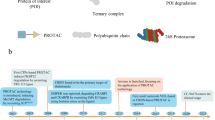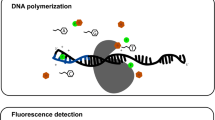Abstract
We investigated the interaction between Polo-Box Domain (PBD) of polo-like kinase 1 (Plk1) and Bora peptide based on protein-protein interactions using the Proteochip (Proteogen, Korea) technology. Plk-1 protein conjugated with GST was bound to anti-GST antibody immobilized on the surface of the Proteochip, after which a Bora peptide labeled with a fluorescent dye, Cy5, was interacted with the Plk-1 protein on the chip in a dose-dependent manner. A chemical compound E8 was screened as a novel inhibitor against the Plk1-Bora interaction using the Proteochip. The compound significantly inhibited NCI-H460 (lung cancer) cell proliferation in vitro in a dose-dependent manner. The protein chip-based Plk1-Bora binding system will serve a novel promising tool which is applicable for screening of novel inhibitors against Plk1, regardless of the enzyme activity.
Similar content being viewed by others
References
Lee, Y. et al. ProteoChip: A highly sensitive protein microarray prepared by a novel method of protein immobilization for application of protein-protein interaction studies. Proteomics. 3, 2289–2304 (2003).
Lee, Y.S., Han, M.H., Kang, D.K., Chang, S.I. & Kang, I.C. High-throughput screening of novel peptide inhibitors of an integrin receptor from the hexapeptide library by using a protein microarray chip. J. Biomolecular Screening 9, 687–694 (2004).
Bang, J.Y. et al. Analysis of anti-angiogenic mechanism of HangAmDan-B(HAD-B), a Korean traditional medicine, using antibody microarray chip. Biochip J. 4, 350–355 (2010).
Strebhardt, K. Multifaceted polo-like kinases: drug targets and antitargets for cancer therapy. Nat. Rev. Drug Discov. 9, 643–660 (2010).
Elia, A.E. et al. The molecular basis for phosphodependent substrate targeting and regulation of Plks by the Polo-box domain. Cell 115, 83–95 (2003).
Elia, A.E., Cantley, L.C. & Yaffe, M.B. Proteomic screen finds pSer/pThr-binding domain localizing Plk1 to mitotic substrates. Science 299, 1228–1231 (2003).
Eckerdt, F. & Maller, J.L. Kicking off the polo game. Trends Biochem. Sci. 33, 511–513 (2008).
Seki, A., Coppinger, J.A., Jang, C.Y., Yates, J.R., & Fang, G. Bora and the kinase Aurora a cooperatively activate the kinase Plk1 and control mitotic entry. Science 320, 1655–1658 (2008).
Lee, K.S. & Erikson, R.L. Plk is a functional homolog of Saccharomyces cerevisiae Cdc5, and elevated Plk activity induces multiple septation structures. Mol. Cell Biol. 17, 3408–3417 (1997).
Jang, Y.J., Lin, C.Y., Ma, S. & Erikson, R.L. Functional studies on the role of the C-terminal domain of mammalian polo-like kinase. Proc. Natl. Acad. Sci. USA 99, 1984–1989 (2002).
Sasakura, Y. et al. Protein microarray system for detecting protein-protein interactions using an anti-His-tag antibody and fluorescence scanning: effects of the heme redox state on protein-protein interactions of heme-regulated phosphodiesterase from Escherichia coli. Anal. Chem. 76, 6521–6527 (2004).
Gali-Muhtasib, H., Roessner, A. & Schneider-Stock, R. Thymoquinone: a promising anti-cancer drug from natural sources. Int. J. Biochem. Cell Biol. 38, 1249–1253 (2006).
Kaseb, A.O. et al. Androgen receptor and E2F-1 targeted thymoquinone therapy for hormone-refractory prostate cancer. Cancer Res. 67, 7782–7788 (2007).
Author information
Authors and Affiliations
Corresponding author
Rights and permissions
About this article
Cite this article
Lee, Jk., Kang, IC. Analysis of Plk1-Bora interaction using a protein chip system. BioChip J 7, 151–155 (2013). https://doi.org/10.1007/s13206-013-7208-6
Received:
Accepted:
Published:
Issue Date:
DOI: https://doi.org/10.1007/s13206-013-7208-6




